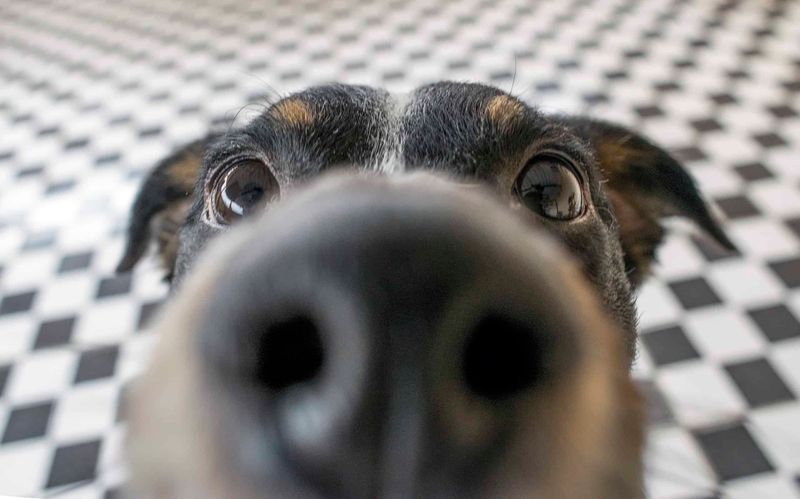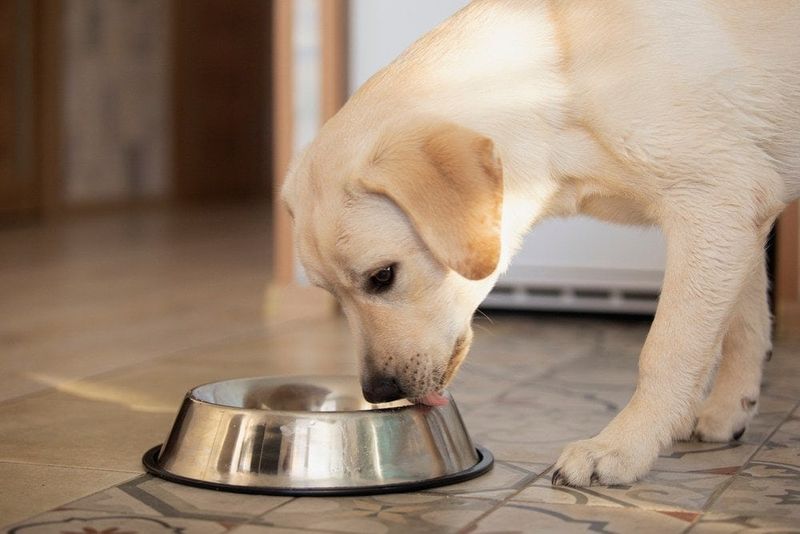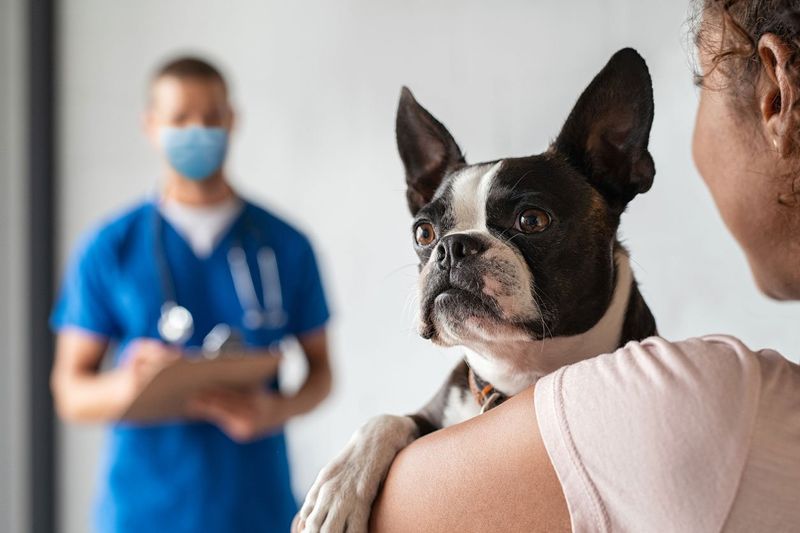10 Facts About Dogs And Black Pepper Every Pet Parent Should Be Aware Of

Black pepper is a common spice found in almost every kitchen, but many dog owners don’t realize how it might affect their furry friends.
As a pet parent, understanding what’s safe for your dog to eat can sometimes feel like navigating a minefield.
From sneezing fits to potential digestive issues, black pepper interacts with dogs in ways you might not expect, and knowing these interactions could help keep your canine companion healthy and happy.
1. Dogs Have Much Stronger Noses Than Humans

Your pup’s nose isn’t just wet and adorable – it’s also incredibly powerful! Dogs possess up to 300 million scent receptors compared to our measly 6 million. This super-sniffing ability means black pepper affects them much more intensely than it affects us.
Even a tiny sprinkle that seems harmless to you might overwhelm your dog’s sensitive snout. Their noses are so sophisticated they can detect odors at concentrations nearly 100,000 times lower than humans can perceive.
This evolutionary adaptation helped their wolf ancestors track prey across vast distances. When your dog encounters black pepper, their reaction isn’t just being picky – it’s their body responding to a genuinely overwhelming sensory experience!
2. Black Pepper Can Cause Sneezing Fits

Remember those cartoon scenes where characters sneeze after sniffing pepper? That’s not just fiction! The compound piperine in black pepper irritates the nasal passages of dogs just like it does in humans – only much more severely.
When your furry friend inhales black pepper particles, their body’s natural defense kicks in to expel the irritant through powerful sneezes. Unlike an occasional human sneeze, dogs might experience prolonged sneezing episodes that can stress them out.
Some pups may paw at their noses or rub their faces against furniture trying to relieve the uncomfortable sensation. While usually temporary, these reactions can be distressing for both you and your four-legged companion.
3. Small Amounts Usually Aren’t Toxic

Good news for when your pup snags a bite of your seasoned dinner! Tiny amounts of black pepper typically won’t poison your dog. Unlike certain foods like chocolate or grapes that can be seriously harmful, black pepper rarely causes severe toxicity issues in small quantities.
Veterinarians generally consider black pepper non-toxic to dogs when consumed in the minimal amounts found in human food. Your furry friend probably won’t need an emergency vet visit if they lick up a few specks that fell on the floor.
However, moderation remains key – while not poisonous, black pepper still isn’t an ideal addition to your dog’s diet. Their digestive systems simply aren’t designed to process spices the way ours are.
4. Pepper Can Irritate Doggy Digestive Systems

Your dog’s tummy isn’t built for spicy adventures! Unlike humans who’ve adapted to enjoy various spices, canine digestive systems remain sensitive to irritants like black pepper. The piperine compound that gives pepper its kick can upset the delicate balance of your pup’s gut.
Common symptoms include increased thirst, gassiness, and sometimes diarrhea or vomiting if they consume more than a tiny amount. Dogs with pre-existing digestive issues like inflammatory bowel disease may experience even stronger reactions.
The canine digestive tract is shorter and processes food differently than ours does. This means irritants move through quickly but can cause uncomfortable inflammation along the way – turning that pepper-seasoned table scrap into an unwelcome digestive surprise.
5. Pepper’s Smell Can Overwhelm Dogs

Ever noticed how your dog reacts when you’re grinding fresh pepper? That powerful aroma that enhances your meal might be sensory overload for your four-legged friend! A dog’s sense of smell works differently than ours – they actually taste much of their food through smelling it first.
Black pepper’s strong scent contains volatile compounds that can overwhelm your pup’s olfactory system. Many dogs will naturally avoid foods with black pepper simply because the smell is too intense for their sensitive noses.
Some clever pet parents actually use this aversion to their advantage. A light dusting of black pepper can sometimes deter dogs from chewing on furniture or plants when other training methods haven’t worked – though gentler deterrents are usually preferable.
6. Ground Pepper Poses More Risks Than Whole Peppercorns

Not all forms of black pepper present equal concerns for your canine companion. Ground pepper creates fine particles that easily become airborne, increasing the likelihood of respiratory irritation when your dog sniffs around seasoned foods.
Whole peppercorns, while still not ideal for dogs, typically cause fewer immediate issues since they’re less likely to be inhaled. However, they present a different risk – if swallowed whole, peppercorns could potentially cause choking in smaller dogs or puppies.
The grinding process also releases more of pepper’s aromatic compounds and oils. This makes freshly ground pepper particularly potent and more likely to cause sneezing or watery eyes in sensitive pups compared to pre-ground pepper that has lost some of its punch over time.
7. Black Pepper Offers No Nutritional Benefits For Dogs

While we humans might appreciate black pepper for its flavor and potential health properties, your furry friend gains absolutely nothing nutritionally from this spice. Dogs evolved as primarily meat-eaters with different dietary needs than omnivorous humans.
The canine digestive system is specialized for processing protein and certain fats – not plant compounds like piperine found in black pepper. Any potential antioxidant benefits that humans might get from pepper simply don’t translate to canine physiology. Your pup already gets everything they need from a balanced dog food formulated specifically for them.
Adding spices like black pepper only introduces unnecessary irritants without providing any health advantages. When it comes to treats and dietary additions, fresh vegetables like carrots or green beans make much better choices!
8. Some Dogs Are More Sensitive Than Others

Just like people, every dog has their own unique personality – and sensitivity level! Brachycephalic breeds (those adorable flat-faced pups like Bulldogs and Pugs) often react more strongly to black pepper because of their already compromised respiratory systems.
Age plays a significant role too. Puppies and senior dogs typically have more sensitive digestive systems than adult dogs in their prime. Your older pooch might have a stronger negative reaction to spiced table scraps than they did in their younger years.
Individual sensitivity varies widely even among dogs of the same breed. Some might barely notice a light sprinkling of pepper, while others might have dramatic sneezing fits or tummy troubles from the smallest amount.
Knowing your particular pup’s tolerance level helps you make better decisions about what foods to keep safely out of reach.
9. Pepper-Based Deterrents Should Be Used Cautiously

Some pet training guides suggest using black pepper as a natural deterrent to stop unwanted behaviors like inappropriate chewing. While this can sometimes work because dogs dislike the smell, it’s not always the kindest approach!
Pepper particles can get trapped in carpet fibers or furniture fabric, creating ongoing irritation long after you’ve forgotten about applying it. This might lead to mysterious sneezing or discomfort that seems unrelated to the original training attempt.
Better alternatives exist that are both effective and gentler on your pup. Commercial bitter apple sprays, citrus scents, or simple redirection techniques typically work just as well without risking respiratory irritation.
Remember – positive reinforcement for good behavior generally creates more lasting results than deterrents, no matter how natural they might be!
10. What To Do If Your Dog Eats Too Much Pepper

Accidents happen – especially with curious canines! If your dog manages to gobble up a pepper-heavy food item, don’t panic immediately. For small amounts, simply provide plenty of fresh water to help ease any mouth or throat irritation they might experience.
Watch for warning signs that might indicate a problem: excessive drooling, repeated sneezing, vomiting, diarrhea, or signs of abdominal discomfort like whining or unusual posture. Most mild reactions will resolve on their own within a few hours as the pepper passes through their system.
For significant amounts or if symptoms seem severe or persistent, it’s always best to contact your veterinarian.
They might recommend bringing your pup in for an examination or suggest home monitoring with specific guidance for your dog’s situation. Better safe than sorry when it comes to your four-legged family member!






